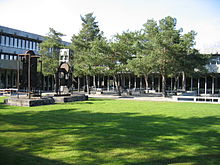DTU Health Tech, Technical University of Denmark and Rigshospitalet, Department of Oncology is seeking a candidate for a PhD position to develop individualized risk-based radiotherapy dose optimization. The successful candidate will join a multidisciplinary team of supervisors (physicists and medical doctors) from the two institutions.
A multidisciplinary research group focuses on developing next generation of treatments on the high technology platform in close collaboration with the clinical team. Two professors in radiation oncology (Lena Specht, MD and physicist Ivan Vogelius) will be part of the team of supervisors for the PhD project.
Responsibilities and qualifications
The goal of the PhD is to develop risk-based dose planning using high-performance computing following the proofs of concepts published in 1,2 but implemented in commercial treatment planning systems using, for example, scripting application programming interface. We hypothesize that it is possible to automatically generate a large number of deliverable radiation dose plans that in combination span the space of realistic clinical compromises. Thus, the aim is to provide the treating physician with a solution space of deliverable radiation dose distributions from which a comprehensive risk assessment procedure should provide decision support on choice of dose delivery taking the risks of long-term adverse effect into account.
The PhD is funded by the Danish Cancer Society and DTU Health in combination.
You must have a two-year master's degree (120 ECTS points) or an equivalent degree in engineering or physics with an interest in radiation physics and medical applications of ionizing radiation.
Approval and Enrolment
The scholarship for the PhD degree is subject to academic approval, and the candidate will be enrolled in one of the general degree programmes at DTU. For information about our enrolment requirements and the general planning of the PhD study programme, please see the DTU PhD Guide.
We offer
We offer an exciting and challenging job in an international academic environment with excellent possibilities for professional and personal development. The successful candidate will work in a cross-disciplinary and cross institutional environment with high ambitions to use technological innovations to improve patient care.
Salary and terms of employment
The appointment will be based on the collective agreement with the Confederation of Professional Associations. The allowance will be agreed with the relevant union. The period of employment is 3 years.
The place of work is DTU Health Tech and Rigshospitalet.
You can read more about career paths at DTU here.
Further information
Further information may be obtained from Ivan Vogelius (ivan.richter.vogelius@regionh.dk, +45 3545 9885) or Jonas Henriksen (jhen@dtu.dk - +45 4058 2866)
If you are applying from abroad, you may find useful information on working in Denmark and at DTU at DTU – Moving to Denmark.
Application procedure
Your complete online application must be submitted no later than 30 August 2021 (Danish time). Applications must be submitted as one PDF file containing all materials to be given consideration. To apply, please open the link "Apply online", fill out the online application form, and attach all your materials in English in one PDF file. The file must include:
- A letter motivating the application (cover letter)
- Curriculum vitae
- Grade transcripts and BSc/MSc diploma
- Excel sheet with translation of grades to the Danish grading system (see guidelines and Excel spreadsheet here)
You may apply prior to obtaining your master's degree but cannot begin before having received it.
All interested candidates irrespective of age, gender, race, disability, religion or ethnic background are encouraged to apply.
DTU Health tech
DTU Health Tech engages in research, education, and innovation base on technical and natural science for the healthcare sector. The Healthcare sector is a globally expanding market with demands for the most advanced technological solutions. DTU Health Tech creates the foundation for companies to develop new and innovative services and products which benefit people and create value for society. DTU Health Techs expertise spans from imaging and biosensor techniques, across digital health and biological modelling, to biopharma technologies. The department has a scientific staff of about 210 persons, 130 PhD students and a technical/administrative support staff of about 160 persons, of which a large majority contributes to our research infrastructure and related commercial activities.
Rigshospitalet, Department of Oncology
Section of radiotherapy within the department of oncology employs 130 people and provide more than 40,000 radiotherapy treatments annually to some 4,300 patients. The department is equipped with state-of-the-art linear accelerators from Varian Medical Systems and a combined MR accelerator from Viewray. In addition, we have two CT scanners, MR scanner, brachytherapy etc. for a total value of equipment exceeding 400 mio DKK.
Technology for people
DTU develops technology for people. With our international elite research and study programmes, we are helping to create a better world and to solve the global challenges formulated in the UN’s 17 Sustainable Development Goals. Hans Christian Ørsted founded DTU in 1829 with a clear vision to develop and create value using science and engineering to benefit society. That vision lives on today. DTU has 12,900 students and 6,000 employees. We work in an international atmosphere and have an inclusive, evolving, and informal working environment. DTU has campuses in all parts of Denmark and in Greenland, and we collaborate with the best universities around the world.
References
- Rechner LA, Modiri A, Stick LB, et al. Biological optimization for mediastinal lymphoma radiotherapy - a preliminary study. Acta Oncol. 2020;59(8):879-887.
- Stick LB, Vogelius IR, Modiri A, et al. Inverse radiotherapy planning based on bioeffect modelling for locally advanced left-sided breast cancer. Radiother Oncol. 2019;136:9-14.
Apply for this job
Apply no later than 30 August 2021
Apply for the job at DTU Health Tech by completing the following form.


